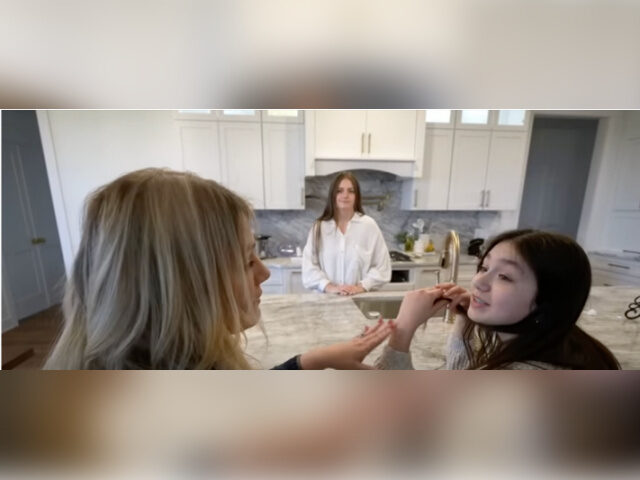Protect Women Ohio (PWO), which describes itself as a pro-woman, pro-parent coalition, is launching two new 60-second advertisements this week aimed at defeating Ohio’s proposed abortion ballot measure.
The ads are entitled “Libby” and “Linda,” and are part of a $5 million statewide television and digital ad buy that began last month. The ads feature Ohio moms Libby McCartney and Linda Corbitt, who raise concerns that the ACLU-backed amendment would eliminate parental notification and consent requirements for minors obtaining abortions or sex change surgeries.
“Parents have every reason to fear the ACLU’s extreme agenda,” said Molly Smith, PWO board member. “As a mom of five, I stand with Libby, Linda, and all Ohio parents in opposing this amendment that threatens our rights. The state government doesn’t know what is best for our kids, we do.”
WATCH:
The campaign comes as pro-abortion activists work to collect 400,000 signatures they need by July 5 to get the amendment on the 2023 November ballot. Ohio Physicians for Reproductive Rights and Ohioans for Reproductive Freedom told the Dayton Daily News in March that they plan to collect a minimum of 700,000 signatures.
“We have been working toward this moment since June of 2022,” Dr. Marcela Azevedo, president of Ohio Physicians for Reproductive Rights said. “We have trained hundreds of volunteers who are eager to begin circulating petitions in communities across our state because they understand the urgent need to ensure that every Ohioan has access to comprehensive reproductive health care including abortion.”
The Ohio Attorney General’s Office certified the summary petition for the potential ballot measure on March 2 before sending it to the Ohio Ballot Board. The Ohio Ballot Board reviewed the proposed amendment and approved it on Monday, meaning pro-abortion activists are cleared to begin collecting signatures to get the measure placed on the ballot this November.
The proposed ballot measure states that “every individual has a right to make and carry out one’s own reproductive decisions, including but not limited to decisions on: contraception, fertility treatment, continuing one’s own pregnancy, miscarriage care, and abortion.”
Under the amendment, the state would not be allowed to:
…directly or indirectly, burden, penalize, prohibit, interfere with, or discriminate against either an individual’s voluntary exercise of this right or a person or entity that assists an individual exercising this right, unless the state demonstrates that it is using the least restrictive means to advance the individuals health in accordance with widely accepted and evidence-based standards of care.
The state could still make laws prohibiting abortions after fetal viability, which the amendment describes as “the point in a pregnancy when, in the professional judgment of the pregnant patient’s treating physician, the fetus has a significant likelihood of survival outside the uterus with reasonable measures. This is determined on a case-by-case basis.” However, late-term abortions would not be allowed to be outlawed “if in the professional judgment of the pregnant patients treating physicians it is necessary to protect the pregnant patient’s life or health.”
PWO, in its press release, pointed to an analysis of the proposed amendment penned by constitutional scholars Carrie Campbell Severino, President of JCN, and Frank J. Scaturro, a former special counsel to the House Select Investigative Panel on Infant Lives. The two argue that the proposed amendment would make Ohio “into a haven for no-limits abortion and other procedures”
Severino and Scaturro wrote:
Headlines have largely framed the proposed amendment as a means of adding a right to abortion to the state constitution. But if it became law, the measure would go much further than these groups’ collective desire to repeal Ohio’s heartbeat law, which generally prohibits abortion upon the detection of fetal heartbeat (typically around six weeks) while still allowing doctors to prevent the death or impairment of major bodily functions of the mother. (The statute was blocked in the state’s lower courts, and the Ohio supreme court is expected to decide its ultimate fate).
Severino and Scaturro argue that the proposal is “so broadly worded that it would prevent the legislature not only from requiring the consent of parents before their child pursues a particular procedure, but also from requiring mere notification of parents — well short of the power to veto their child’s decision — before the procedure takes place.” They further contend the text goes beyond abortion because of the use of the broad term “reproductive decisions.”
“By explicitly defining such decisions as “not limited to” the enumerated categories, the proposal establishes its scope as sweeping,” they wrote.
“A natural reading would extend to any medical procedure that involves the human reproductive system, including sex-change surgery,” they continued. “The language also applies to individuals without any age qualification, so the proposal makes no distinction between adults and minors. Additional language would deny parents the right to any intervention on behalf of their children that would discourage them from obtaining the procedure in question.”

COMMENTS
Please let us know if you're having issues with commenting.